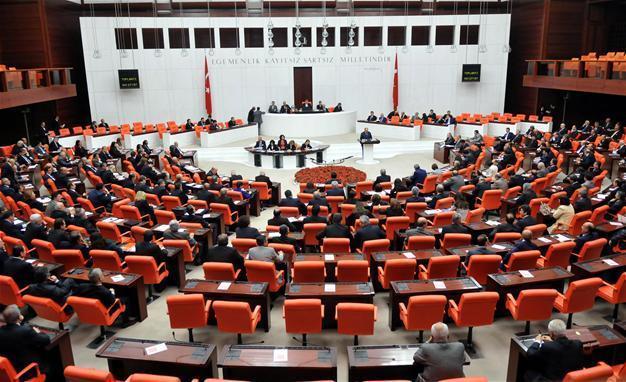Parliament set to begin charter talks to shift governance system
Nuray Babacan - ANKARA
 Turkey’s parliament is set to commence two-stage discussions on government-drafted constitutional amendments on Jan. 9 that are set to usher in a major change in the country’s governance system for an executive presidency despite oppositional concerns that it will lead to authoritarian rule.
Turkey’s parliament is set to commence two-stage discussions on government-drafted constitutional amendments on Jan. 9 that are set to usher in a major change in the country’s governance system for an executive presidency despite oppositional concerns that it will lead to authoritarian rule.While the ruling Justice and Development Party (AKP) plans to finish the discussions on the 18-article constitutional proposal in the general assembly in six days, the main opposition Republican People’s Party (CHP), which opposes the proposal, is planning to block the talks.
The CHP’s decision came after meetings held with the AKP about the procedure regarding the discussions to be taken in parliament. The two parties failed to agree on the procedure for the three-day meetings.
The CHP’s request to extend the duration of the lawmakers’ speeches on the items was rejected.
However, a previous request by the CHP to broadcast the discussions on Parliament TV on the state broadcaster was accepted by Prime Minister Binali Yıldırım, despite opposition from the AKP administration.
Parties have different plans for negotiations
Taking the previous constitutional negotiations into consideration, the ruling party anticipates that it will finish discussions on each item in a maximum of four hours. For each item, a total of seven resolutions can be given, four from parties and three from lawmakers.
With this calculation, the AKP plans to finish the discussions of three items every day, by working 12 hours on average each day. The party is planning to pass the package on Jan. 24 in parliament and plans to hold a referendum on April 2.
However, discussions and obstacles may result in the periods being exceeded. If the debate between the opposition and ruling party grows, the CHP may demand “a continuation of negotiations,” or it may prolong the process by issuing motions of no-confidence against ministers.
The process of the constitutional package may be interrupted because the motions of no-confidence are obliged to be negotiated within a certain period of time.
Two stages of voting
The final decision regarding the constitutional offer will be made in the second round of voting, which is scheduled for Jan. 21. The lawmakers will vote on each item first and then on the entire package.
The second round of voting is expected to be finished in three days because no speeches or resolutions will occur in this round.
In this case, each item will be voted and if the item receives fewer than 330 votes, it will be dismissed from the package.
After each item is voted, the entire package will be submitted for a vote. If the entire package does not receive at least 330 votes, the package will be considered rejected. The offer cannot be submitted to the assembly for another year.
AKP and MHP out to avoid losing votes
The bloc of the AKP and the Nationalist Movement Party (MHP), with whom the government drafted the charter proposal, is making a special effort to prevent any defections from their parties in an effort to reach the 330 votes needed to bring the constitution to the referendum. The total number of votes of two parties reaches 355, but seven lawmakers from the MHP have already publicly declared their opposition to the package.
Despite criticisms about the content of the package, the AKP does not expect any losses in the votes, while the number of defectors from the two parties is not expected to exceed 15 lawmakers.
Nevertheless, the parties are taking precautions to prevent any losses.
Previously, lawmakers began a debate on engaging in “open voting” for this purpose. Some have suggested that some lawmakers will vote openly in an effort to exert pressure on other lawmakers that might be considering voting against the package.
In the past the parties used methods such as “voting without closing the cabin, collecting vote stamps or man-to-man marking.”
















